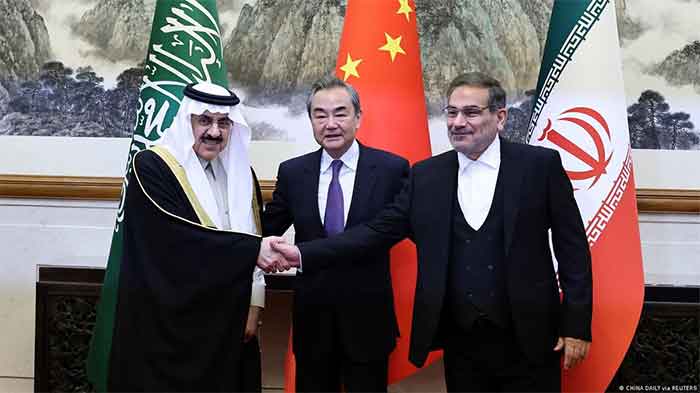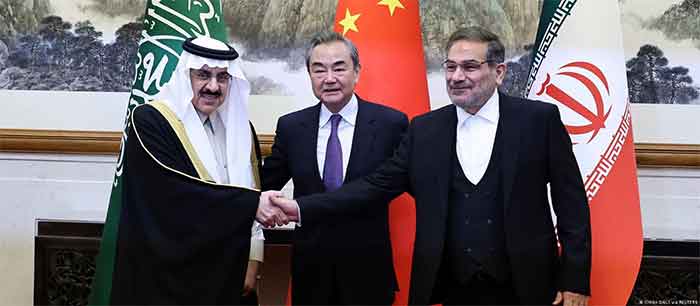
How seriously should steps being taken by certain Arab countries towards apparently strengthening their regional relations be taken? These include inclusion of Syria into Arab League after a gap around 12 years, improvement of ties between Saudi Arabia and Iran as well as nature of their ties with Russia and China. Each of these is suggestive of a major change in their diplomatic attitude towards United States. Clearly, they no longer seem inclined to pursue only diplomatic moves which please Washington and/or remain confined to diplomatic dictates laid out by White House. The superpower certainly does not approve a favorable turn in approach of any country towards Iran and Syria. At the same time, at present, it cannot afford to consider risking its “friendly” ties with key Arab nations by displaying such diplomacy.
Not surprisingly, at present, US has chosen to adopt a rather quiet approach towards Arab diplomacy. Media coverage of Ukraine-crisis as well as Washington’s stand regarding this and role of Russia and China on this front are probably playing their part in diverting maximum attention to these and minimal to Arab diplomacy. Nevertheless, considering that certain Arab countries earlier paid primary importance to their bilateral ties with US, the recent shift in their multilateral, regional as well as bilateral ties demands attention. Now, as suggested, they are also giving importance to their ties with rivals of US as well as enhancing their regional diplomacy.
Assuming that Washington may be pleased with this shift in Arab diplomacy would be totally erroneous. The same may be said about Arab nations being unaware of this reality. But despite their being conscious of United States’ stand on this front, their moving ahead with their regional diplomacy as well as their relations with superpower’s key rivals may be viewed as suggestive of several crucial points.
It may not be wrong to assume that phase of so-called Arab Spring, now labelled as Arab Winter, has cautioned Arab countries tremendously about not being taken for a ride by United States’ diplomatic rhetoric. In addition, they seem to have become more conscious about asserting their diplomatic identity bilaterally, regionally and multi-laterally. Well, they have the right to do so, without being exclusively guided and/or bound by United States’ diplomatic priorities. This is also suggestive of their being on guard about getting caught in any dependency trap. Chances of this do prevail if they ignore their regional ties and/or entertain close ties with only one key power and its bloc.
Ukraine-crisis being prolonged and aggravated because of US-Russia rivalry has probably further convinced Arab nations about dangers posed by being confined to one camp. In addition, their geographical proximity, common cultural values and several other factors are apparently guiding them to increase their diplomatic ties. Certainly, they cannot be expected to push their mutual differences instantly to the backburner. Nevertheless, what deserves importance is their apparent willingness to sort them out through dialogue and not by turning their back towards each other, leading to conflict. This is suggested by positive turn in ties between Saudi Arabia and Iran, to a degree made possible by China’s diplomatic efforts. It may be noted, China has entertained strong economic ties with both Saudi Arabia and Iran.
Though not much has been said about it, the hard reality regarding impact of “Arab Spring” in the name of democratic revolution and its negative aftermath cannot be assumed to have contributed to a favorable approach of Arab countries towards United States. This is not simply in context of monarchs being in power in several Arab nations. The phase – “Arab Spring”- confronted and probably also shocked them with certain hard-hitting realities. These include the dominant role played by “unilateral” diplomatic approach of United States’ foreign policy on practically most issues, including Arab Spring. This was aggravated by limited reach of Arab media and tendency of practically greater part of the world to be guided by what western media, particularly American said about them. To a degree, this has been responsible for “negative,” stereotyped visions held about Arab world, anti-Islamic perceptions as well as linking these with terrorism. The perception that these views contributed to “justifying” the noise made by US about “Arab Spring” cannot be ignored.
Perhaps, these led to a certain awakening among Arab nations about limitations spelt by weakness of their regional diplomacy and excessive importance accorded to being aligned with one camp. Though formed in 1945, Arab League’s history isn’t marked by strong cooperation among its members. Initially, it had six members and has 22 at present. Of late, greater importance being given by this organization to strengthening cooperation among themselves stands out. This has been partly attributed to the organization being at present headed by Saudi Arabia and a key move of Crown Prince Bin Salman being directed towards enhancing diplomatic role as well as importance of Riyadh. This is suggested by Syria being welcomed back to Arab League and its recent Riyadh-summit being attended by Ukraine President Volodymyr Zelensky. It is not possible to list any one reason as responsible for insuring participation of these two countries. However, considering that both are facing crises, the possible role of Arab League, especially Riyadh in mediating towards “peace” may be viewed as a part of Salman’s aim towards enhancing diplomatic importance of Saudi Arabia.
Irrespective of the fact whether these diplomatic intensions are viewed as rhetoric or genuine, there is no denying that Arab countries have learnt the hard way that remaining embroiled in their conflicts is least likely to be of any help to them. This is also suggested by attempts being made to settle intra-Sudan conflict. Sudan became a member of Arab League in 1956. At least, some initiative has been taken on this front. The same may be said about steps being taken to resolve Yemen crisis. They seem to have become conscious that remaining engaged in their conflicts is not going to be of any advantage to either of them. Rather, given their economic as well as strategic importance, including that of Yemen as well as Sudan, they place a lot at risk by giving greater importance to indulging in war-like moves against each other.
Equally relevant is the limited role played by superpower in solving Palestinian issue as well as regional crises troubling Lebanon, Syria and so forth. Arab people are well aware of these hard realities and also about United States’ relations with Israel. While diplomatic ties between Israel and several Arab countries have been initiated, that majority of Arab people reportedly don’t approve recognition of Israel as a state cannot be ignored. In addition, they are not oblivious of the negative aftermath of “Arab Spring” with specific focus on the impact it has had on attitude of Arabs- leaders as well as people- towards US particularly. Certainly, while the West has adopted a silent approach regarding Arab Winter, the Arabs –irrespective of whether they have been directly affected or not – cannot be expected to remain unconscious of the same. To a degree, the new importance being accorded to Arab diplomacy is also suggestive of a subtle but definite attempt being made to give importance to their own communication diplomacy at the inter-government level and among the people. This point is also suggestive of great importance being probably given by leaders to various opinions formed among people of what Arab Winter has meant for them. A lot more can be written on this aspect but this may be limited to Arabs hardly being pleased with their identity and their religion being easily linked with terrorism. They do not also favor United States’ friendly relations with Israel, sufferings faced by Palestinians, Libyans, Iraqis as well as people in Yemen, Lebanon, Syria and elsewhere in the Arab world. To a degree, Arab diplomacy is suggestive of Arab leaders’ inclination to take steps to resolve these, giving “peace” at least some importance.
Yes, neither of these problems can be solved in a few days. But continuation of the same is likely to spell only greater misery for affected people. Intra-fighting in Sudan may be viewed as another example of what and how strategic interests of rival external powers can lead to. It is not simply the quest for power within Sudan but also that of its control by key external powers. Arab countries are well aware of their strategic significance. Their probably prevails uneasiness among them about other Arab leaders and/or countries being used as pawns, bargaining chips or whatever, with “key players” displaying little concern for the sufferings this may lead to. It is not without reason that key Arab countries are at present asserting their diplomatic cards regarding their deals with rival non-Arab countries more shrewdly than probably latter expected them to. That the Riyadh summit of Arab League was marked by return of Syria to the fold and participation of Ukraine may perhaps be viewed as diplomatic display of its members’ decisions to avoid being caught in conflict of key powers. Arab countries have comprehended and accepted irrationality of this approach diplomatically as well as regarding its impact at ground-level. Hard illustrations of this, as indicated earlier, are Arab Winter, Ukraine-crisis and of course various regional crises within Arab world. While China is certainly taking Arab diplomacy seriously, Russia is probably pleased about it. Suspense prevails about Washington’s stand, given that it has been caught off-guard by diplomatic moves linked with Saudi-Iran ties, Syria’s return to Arab League and so forth. Diplomatically, strategically, economically and at other levels, Arab countries have a long road ahead. As for now, they have stepped forward and not refrained from displaying importance of these diplomatic steps!
Nilofar Suhrawardy is a senior journalist and writer with specialization in communication studies and nuclear diplomacy. She has come out with several books. These include:– Modi’s Victory, A Lesson for the Congress…? (2019); Arab Spring, Not Just a Mirage! (2019), Image and Substance, Modi’s First Year in Office (2015) and Ayodhya Without the Communal Stamp, In the Name of Indian Secularism (2006).














































